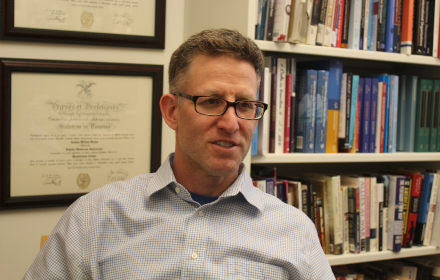By Jacob Paxson, Transcript Correspondent
“A new nation needs to step up to combat climate change during the United States’ absence as leaders under the Trump administration,” Joshua W. Busby said.
Joshua W. Busby, Ph.D is a University of Texas-Austin associate professor and senior research fellow for the Climate and Security Center, spoke at Ohio Wesleyan University in the Hamilton-Williams Campus Center on Thursday, March 22 during an event sponsored by the International Studies Program and the Arneson Institute for Practical Politics and Public Affairs.
There were around sixty people from the OWU campus and Delaware area who engaged in the discussion and were genuinely interested in his speech about the current state of climate change globally and the work being done to combat the issue.
Busby began with the issue of the United States’ intent to withdraw from the Paris Climate Agreement, which countries sign to pledge a decreased percentage of annual gas emissions, removing themselves as a large player in reducing pollution and potentially being a large overseer of other countries to make sure they keep their agreements.
He still stated optimism about the future of the United States’ role in preventing climate change as an official withdrawal can’t take place until 2020 immediately after the next presidential election.
Although Busby fears the negative impact that the Trump administration’s vacancy will have he offered ideas for candidates to relieve the duties of the United States giving confidence that the problem will lessen between now and 2020 without United States leadership.
“This is a global issue that impacts everyone’s lives negatively and that should make them want to help,” Busby said. “We need commitments be enforced for reducing emissions; the current state of policy is not very official and countries to not need to uphold their pledges.”
He stated that the leading candidates to help prevent the current course of temperature increases annually are: China, India, Northern California and the European Union. These areas have worldly influence and can cut their own emissions to help further the process.
Despite stating that an effective leader emerging is the best solution, Dr. Busby does bring up some issues that could make reaching this solution difficult.
“It is difficult to prevent everyone from polluting with much of the pollutants coming from private actors and there are 190 countries to try to convince that they need to reduce their annual emissions,” Busby said. “Natural gas is the present and very problematic, but it is difficult to transition to fully renewable energy; the middle east would lose most its income being forced to change means of production,”
This transition being unable to happen quickly and having a challenging time convincing all countries to heavily regulate pollutants makes it difficult to lower annual emissions. This is a
main point he states as to why climate change needs a strong leader and attention as a bunch of smaller problems in which countries will work together to combat the problem.
“The top four countries account for 60 percent of the emissions in the world and two of them, the United States and China are not playing a productive role in trying to cut their own emissions and help hold other countries accountable,” Busby said.
He said that many of the major polluters are not cutting back on emissions, climate change advocacy meetings are not very productive and there isn’t nearly enough funding with only $10 billion raised between 2015-2018 where the expected value to combat climate change is $100 billion annually.
“We need to address climate change and understand the problem better. With a leader to successfully enforce lower emissions the problem can be mitigated,” Busby said. “The plan for the future is to be highly ambitious in 2020, have the United States reclaim leadership to bring about change at the Paris Climate Agreement Global Stocktake in 2023.”
